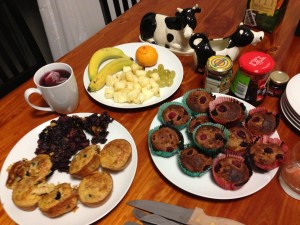When I think chia seeds, I think chia pet head with hairstyles by Lyle Lovett or the dude from Eraserhead.
But when a microbiologist and cook marries a French professor, anything is  possible.
possible.
I prefer fun with fermentations, but Amy’s trying this largely lactose and gluten reduced diet because of diagnosed intolerances. I’m old but can try some new things.
A couple of French professors from Wales who were in New York for years and now Adelaide came to visit for the weekend to take in the British Lions versus the Queensland Reds rugby match Saturday night.
We entertained them at the ocean (low tide) and I woke up early and tried  some new approaches to baking for breakfast.
some new approaches to baking for breakfast.
The muffins on the right are primarily buckwheat flour, with some quinoa and coconut flour, a bunch of fruit, and stuff.
The things on the left are polenta rolls, with some quinoa, garlic, rosemary, and, chia seeds.
Both made with soy milk and lime.
And now that chia seeds are widely available and favored by hispsters, it’s a good idea the UK Food Standards Agency is going to evaluate their safety.
Infoods Ltd (based in the UK). It is requesting an opinion from the Agency on the ‘equivalence’ of their chia seeds, which are grown in particular regions of South America, with the chia seeds grown in Australia and marketed by The Chia Company.
The European Novel Foods Regulation includes a simplified approval procedure for when a company believes its novel food is substantially 
equivalent to a food that is already on the market. In such a situation, the applicant can submit a notification to the European Commission after obtaining an opinion on equivalence from an EU Member State – in this case the UK.
Chia is a summer annual herbaceous plant belonging to the Labiatae family. The plant grows from a seedling to develop lush green foliage before it produces long flowers that are either purple or, less commonly, white. These flowers develop into seed pods to produce chia seeds. Although chia is grown commercially in several Latin American countries and Australia, the seeds have not been consumed to a significant degree in Europe.
The applicants’ chia seeds will be used in the same products as those for which approval was granted earlier this year for The Chia Company’s seeds (bread products, breakfast cereal, fruit, nut and seed mixes and bread and 100% packaged chia seeds).

